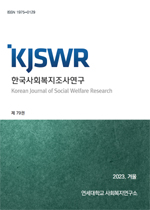A study on the social service needs types of young adult and influencing factors
A study on the social service needs types of young adult and influencing factors
- 연세대학교 사회복지연구소
- 한국사회복지조사연구
- 79권
-
2023.12125 - 163 (39 pages)
-
DOI : 10.17997/SWRY.79.1.5
- 246

본 연구는 청년의 사회서비스 욕구를 유형화하여 그 특성을 파악하고, 욕구 유형을 구별하는영향 요인을 확인하고자 하였다. 이를 위해 2021년 청년 사회·경제실태조사 데이터를 활용하여잠재계층분석(LCA), 기초분석, 다중회귀분석을 실시하였다. 분석 결과, 청년의 사회서비스 욕구유형은 ‘고용·건강·주거 욕구 집중형(26.7%)’, ‘사회서비스 전반 욕구 고수준형(27.7%)’, ‘욕구저수준형(23.1%)’, ‘문화·여가 욕구 집중형(22.5%)’의 네 개 집단으로 구분되었다. 또한 청년의사회서비스 욕구 유형은 청년의 연령, 거주지역, 가구유형 등 인구사회학적 특성에 따라 집단 간차이가 있었다. 마지막으로 다항로지스틱 분석을 통해 청년의 사회서비스 욕구 유형 중 욕구 저수준형을 기준으로 2개 이상의 복합욕구를 보인 집단을 구분하는 공통 예측 요인은 가구유형과 거주지역인 것을 확인했다. 더불어 신체 건강 및 정신 건강상의 어려움을 겪는 청년은 사회서비스전반 욕구 고수준형, 미취업 또는 실업 상태이거나 비정규직일 경우 고용·건강·주거 욕구 집중형일 가능성이 높았다. 이러한 분석 결과를 바탕으로 청년 대상의 사회서비스 정책 추진시 청년의사회서비스 욕구와 함께 청년 집단 내의 이질성을 고려한 정책 설계의 필요성을 제안하였다.
This study aimed to categorize the social service needs of young adults, identify their characteristics, and identify the influencing factors that distinguish the types of needs. To this end, latent class analysis(LCA), basic analysis, and multiple regression analysis were conducted on the 2021 Youth Socio-Economic Survey data. The analyses classified the youth’s needs for social services into four groups: employment, health, and housing needs-intensive(26.7%), high even level in all needs (27.7%), low-level needs(23.1%), and culture and leisure needsoriented( 22.5%). In addition, this study confirmed that the types of social service needs of young people differ between groups depending on demographic characteristics such as age, residence area, and household type. Finally, by the multinomial logistic analysis, it was examined that among the types of social service need of young people, common predictive factors for distinguishing between groups with two or more complex needs based on low-level need were household type and residential area. In addition, young people with physical and mental health difficulties tended to pursue high-level, complex needs, while those who are job seekers, unemployed, or irregular workers showed a tendency to place their needs on employment, health, and housing. The results of this analysis suggest that the design and implementation of social service policies for young people should take into account the heterogeneity within the youth group as well as their social service needs.
I. Introduction
II. Theoretical Background
III. Method
IV. Research Results
V. Discussion and Suggestions
References
(0)
(0)